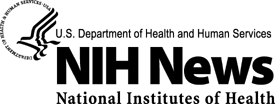 |
|
|
FOR IMMEDIATE RELEASE:
June 8, 1999 #98-07 08 Jun 1999: Reports in Children's Environmental Health Issue Suggest: Maternal Vitamins Reduce Risk of Children's Brain Tumors; Endocrine Disruptors at Critical Points Can Hurt Development
These findings are part of the June supplemental issue published by Environmental Health Perspectives (http://www.ehponline.org/), the journal of the National Institute of Environmental Health Sciences (http://www.niehs.nih.gov/). The special issue includes a unique compilation of research papers and review articles devoted entirely to current research on environmental exposures and health outcomes for children. Article abstracts are available to interested reporters free of charge. Other reports from this special issue include:
The issue is divided into two sections, the first of which includes 12 papers originally presented at a national research conference entitled Children's Environmental Health: Research, Practice, Prevention and Policy, held in Washington, D.C. in February 1997. The meeting was convened by over 200 of the nation's experts in order to outline a research agenda designed to address the environmental exposures that put our children at risk. The second section contains seven scientific reports presented at a conference on Preventable Causes of Cancer in Children, convened by the U.S. Environmental Protection Agency (http://www.epa.gov) "Children are uniquely vulnerable to environmental toxicants because of their greater relative exposure, their less developed metabolism, and higher rates of cell production, growth, and change," writes Dr. Joy Carlson, an epidemiologist with the Children's Environmental Health Network (http://www.cehn.org/index.html) The research papers cover a broad range of disorders - asthma and respiratory diseases, endocrine disruption, childhood cancers, and nervous system and developmental effects - each addresses a larger health issue as it relates to prevention-oriented intervention. These include identification of patterns of environmental diseases, assessment of children's exposures to environmental toxicants, quantification of dose-response relationships, and recognition of critical periods of vulnerability. "This once-neglected area of children's health is now a top priority for researchers and policy-makers," said Thomas Goehl, Ph.D., science editor for EHP Supplements. Reporters and the public may obtain the article abstracts by accessing the Environmental Health Information Service at http://www.ehponline.org/, or may have the full report mailed to them beginning June 8th. Those who wish to obtain free one-day access to the full-length version of these articles should contact Thomas Goehl at 919-541-7961. Regular subscriptions (http://www.ehponline.org/docs/admin/suboptions.html) are also available through the Environmental Health Information Service. |
|


